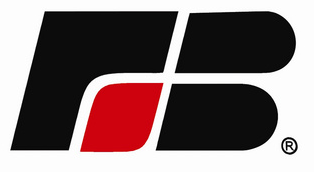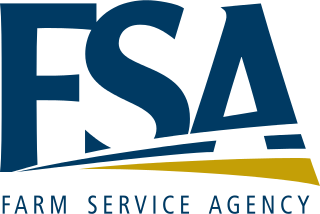
Insurance is a means of protection from financial loss in which, in exchange for a fee, a party agrees to compensate another party in the event of a certain loss, damage, or injury. It is a form of risk management, primarily used to hedge against the risk of a contingent or uncertain loss.
Terrorism insurance is insurance purchased by property owners to cover their potential losses and liabilities that might occur due to terrorist activities.

The American Farm Bureau Federation (AFBF), more informally called the American Farm Bureau (AFB) or simply the Farm Bureau, is a United States-based 501(c)(5) tax-exempt agricultural organization and lobbying group. Headquartered in Washington, D.C., the Farm Bureau has affiliates in all 50 states and Puerto Rico. Each affiliate is a (state or county) Farm Bureau, and the parent organization is also often called simply the Farm Bureau.

The Farm Service Agency (FSA) is the United States Department of Agriculture agency that was formed by merging the farm loan portfolio and staff of the Farmers Home Administration (FmHA) and the Agricultural Stabilization and Conservation Service (ASCS). The Farm Service Agency implements agricultural policy, administers credit and loan programs, and manages conservation, commodity, disaster, and farm marketing programs through a national network of offices. The Administrator of FSA reports to the Under Secretary of Agriculture for Farm Production and Conservation. The current administrator is Zach Ducheneaux. The FSA of each state is led by a politically appointed State Executive Director (SED).

Reinsurance is insurance that an insurance company purchases from another insurance company to insulate itself from the risk of a major claims event. With reinsurance, the company passes on ("cedes") some part of its own insurance liabilities to the other insurance company. The company that purchases the reinsurance policy is referred to as the "ceding company" or "cedent". The company issuing the reinsurance policy is referred to as the "reinsurer". In the classic case, reinsurance allows insurance companies to remain solvent after major claims events, such as major disasters like hurricanes or wildfires. In addition to its basic role in risk management, reinsurance is sometimes used to reduce the ceding company's capital requirements, or for tax mitigation or other purposes.

General Reinsurance Corporation is an American multinational property/casualty and life/health reinsurance company offering a range of reinsurance products and services. The company is a primarily direct reinsurer and is represented in all major reinsurance markets worldwide through a network of more than 40 offices. Gen Re is a wholly owned subsidiary of Berkshire Hathaway Inc.
Crop insurance is insurance purchased by agricultural producers and subsidized by a country's government to protect against either the loss of their crops due to natural disasters, such as hail, drought, and floods ("crop-yield insurance", or the loss of revenue due to declines in the prices of agricultural commodities.
Chubb Limited is an American company incorporated in Zürich, Switzerland. It is the parent company of Chubb, a global provider of insurance products covering property and casualty, accident and health, reinsurance, and life insurance and the largest publicly traded property and casualty company in the world. Chubb operates in 55 countries and territories and in the Lloyd's insurance market in London. Clients of Chubb consist of multinational corporations and local businesses, individuals, and insurers seeking reinsurance coverage. Chubb provides commercial and personal property and casualty insurance, personal accident and supplemental health insurance, reinsurance and life insurance.

The Terrorism Risk Insurance Act (TRIA) is a United States federal law signed into law by President George W. Bush on November 26, 2002. The Act created a federal "backstop" for insurance claims related to acts of terrorism. The Act "provides for a transparent system of shared public and private compensation for insured losses resulting from acts of terrorism." The Act was originally set to expire December 31, 2005, was extended for two years in December 2005, and was extended again on December 26, 2007. The Terrorism Risk Insurance Program Reauthorization Act expired on December 31, 2014.
Insurance law is the practice of law surrounding insurance, including insurance policies and claims. It can be broadly broken into three categories - regulation of the business of insurance; regulation of the content of insurance policies, especially with regard to consumer policies; and regulation of claim handling wise.
QBE Insurance Group Limited is a general insurance and reinsurance company listed on the Australian Securities Exchange and headquartered in Sydney. The company employs more than 11,700 people in over 27 countries. Across its operations, QBE offers commercial, personal and specialty products and risk management products.
The agricultural policy of the United States is composed primarily of the periodically renewed federal U.S. farm bills. The Farm Bills have a rich history which initially sought to provide income and price support to US farmers and prevent them from adverse global as well as local supply and demand shocks. This implied an elaborate subsidy program which supports domestic production by either direct payments or through price support measures. The former incentivizes farmers to grow certain crops which are eligible for such payments through environmentally conscientious practices of farming. The latter protects farmers from vagaries of price fluctuations by ensuring a minimum price and fulfilling their shortfalls in revenue upon a fall in price. Lately, there are other measures through which the government encourages crop insurance and pays part of the premium for such insurance against various unanticipated outcomes in agriculture.
Insurance in the United States refers to the market for risk in the United States, the world's largest insurance market by premium volume. According to Swiss Re, of the $6.861 trillion of global direct premiums written worldwide in 2021, $2.719 trillion (39.6%) were written in the United States.

The Federal Crop Insurance Corporation (FCIC) is a wholly owned government corporation managed by the Risk Management Agency of the United States Department of Agriculture. FCIC manages the federal crop insurance program, which provides U.S. farmers and agricultural entities with crop insurance protection.

The Agriculture Risk Protection Act of 2000 made major revisions to the United States' federal crop insurance program and provided emergency agricultural assistance. The crop insurance provisions significantly increased the program's government subsidy; improved coverage for farmers affected by multiple years of natural disasters; and authorized pilot insurance programs for livestock farmers and growers of other farm commodities that were not served by crop insurance, among many other provisions. The emergency provisions made available a total of $7.14 billion in emergency farm assistance, mostly in direct payments to growers of various commodities to compensate for low farm commodity prices.

The Federal Crop Insurance Reform and Department of Agriculture Reorganization Act of 1994, Pub. L.Tooltip Public Law 103–354, 108 Stat. 3178, was introduced on April 14, 1994 by Eligio de la Garza (D-TX) and was signed into law on October 13, 1994 by President William J. Clinton. It consisted of two titles:
Multi-Peril Crop Insurance (MPCI) is the oldest and most common form of the federal crop insurance programme in the United States of America. MPCI protects against crop yield losses by allowing participating producers to insure a certain percentage of historical crop production. A single policy protects crops against all natural perils including adverse weather, fire, insects, disease, wildlife, earthquake, volcanic eruption and failure of irrigation water due to unavoidable causes. It is delivered by private companies and reinsured by the federal government.
The Nonadmitted and Reinsurance Reform Act of 2010 is a United States law regulating the sale of insurance in states where the insurer is usually not authorized to sell insurance. It prevents states other than the home state of a U.S. insurance company from imposing regulations or taxes on the sale of nonadmitted insurance.

The Agricultural Act of 2014 is an act of Congress that authorizes nutrition and agriculture programs in the United States for the years of 2014–2018. The bill authorizes $956 billion in spending over the next ten years.
Multiple-peril insurance coverage is a kind of insurance that bundles together multiple coverages that typically would be needed with each other. Typically the package may include coverage for business crime, business automobile, boiler and machinery, marine, or farm. The benefits to purchasing multiple-peril insurance coverage include lower overall premium costs for the insured because of the benefits that the insured receives on the basis of an all-in-one type package, as well as broader coverage for losses that typically occur together, like flood damage to an insured's basement and wind damage to an insured's roof.






